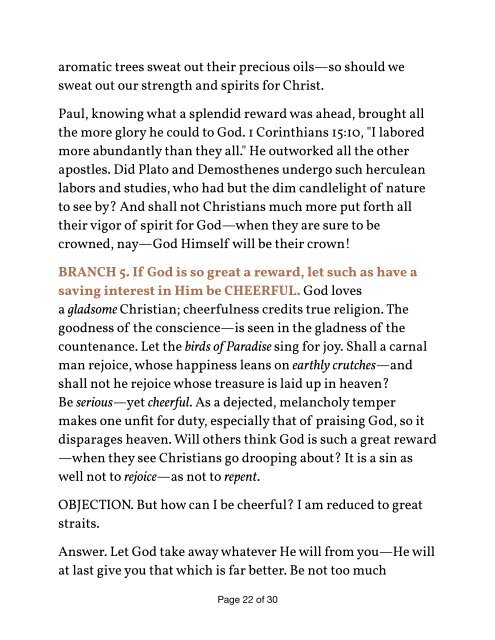God is His Peoples Great Reward by Thomas Watson 1620-1686
Thomas Watson is no doubt one of the most well-beloved of all of the Puritan authors. Few better guides have existed in this or any other area of spiritual experience than Thomas Watson. He was a master of both Scripture and the human heart, and wrote with a simplicity and directness that keeps his work fresh and powerful for the twenty-first century. Watson was educated at Emmanuel College, Cambridge, where he was noted for remarkably intense study. In 1646 he commenced a sixteen year pastorate at St. Stephen's, Walbrook. He showed strong Presbyterian views during the civil war, with, however, an attachment to the king, and in 1651 he was imprisoned briefly with some other ministers for his share in Christopher Love's plot to recall Charles II of England. He was released on June 30, 1652, and was formally reinstated as vicar of St. Stephen's Walbrook. Watson obtained great fame and popularity as a preacher until the Restoration, when he was ejected for nonconformity. Notwithstanding the rigor of the acts against dissenters, Watson continued to exercise his ministry privately as he found opportunity. Upon the Declaration of Indulgence in 1672 he obtained a license to preach at the great hall in Crosby House. After preaching there for several years, his health gave way, and he retired to Barnston, Essex, where he died suddenly while praying in secret. He was buried on 28 July 1686.
Thomas Watson is no doubt one of the most well-beloved of all of the Puritan authors. Few better guides have existed in this or any other area of spiritual experience than Thomas Watson. He was a master of both Scripture and the human heart, and wrote with a simplicity and directness that keeps his work fresh and powerful for the twenty-first century. Watson was educated at Emmanuel College, Cambridge, where he was noted for remarkably intense study. In 1646 he commenced a sixteen year pastorate at St. Stephen's, Walbrook. He showed strong Presbyterian views during the civil war, with, however, an attachment to the king, and in 1651 he was imprisoned briefly with some other ministers for his share in Christopher Love's plot to recall Charles II of England. He was released on June 30, 1652, and was formally reinstated as vicar of St. Stephen's Walbrook.
Watson obtained great fame and popularity as a preacher until the Restoration, when he was ejected for nonconformity. Notwithstanding the rigor of the acts against dissenters, Watson continued to exercise his ministry privately as he found opportunity. Upon the Declaration of Indulgence in 1672 he obtained a license to preach at the great hall in Crosby House. After preaching there for several years, his health gave way, and he retired to Barnston, Essex, where he died suddenly while praying in secret. He was buried on 28 July 1686.
- No tags were found...
Create successful ePaper yourself
Turn your PDF publications into a flip-book with our unique Google optimized e-Paper software.
aromatic trees sweat out their precious oils—so should we<br />
sweat out our strength and spirits for Chr<strong>is</strong>t.<br />
Paul, knowing what a splendid reward was ahead, brought all<br />
the more glory he could to <strong>God</strong>. 1 Corinthians 15:10, "I labored<br />
more abundantly than they all." He outworked all the other<br />
apostles. Did Plato and Demosthenes undergo such herculean<br />
labors and studies, who had but the dim candlelight of nature<br />
to see <strong>by</strong>? And shall not Chr<strong>is</strong>tians much more put forth all<br />
their vigor of spirit for <strong>God</strong>—when they are sure to be<br />
crowned, nay—<strong>God</strong> Himself will be their crown!<br />
BRANCH 5. If <strong>God</strong> <strong>is</strong> so great a reward, let such as have a<br />
saving interest in Him be CHEERFUL. <strong>God</strong> loves<br />
a gladsome Chr<strong>is</strong>tian; cheerfulness credits true religion. The<br />
goodness of the conscience—<strong>is</strong> seen in the gladness of the<br />
countenance. Let the birds of Parad<strong>is</strong>e sing for joy. Shall a carnal<br />
man rejoice, whose happiness leans on earthly crutches—and<br />
shall not he rejoice whose treasure <strong>is</strong> laid up in heaven?<br />
Be serious—yet cheerful. As a dejected, melancholy temper<br />
makes one unfit for duty, especially that of pra<strong>is</strong>ing <strong>God</strong>, so it<br />
d<strong>is</strong>parages heaven. Will others think <strong>God</strong> <strong>is</strong> such a great reward<br />
—when they see Chr<strong>is</strong>tians go drooping about? It <strong>is</strong> a sin as<br />
well not to rejoice—as not to repent.<br />
OBJECTION. But how can I be cheerful? I am reduced to great<br />
straits.<br />
Answer. Let <strong>God</strong> take away whatever He will from you—He will<br />
at last give you that which <strong>is</strong> far better. Be not too much<br />
Page<br />
22 of 30

















